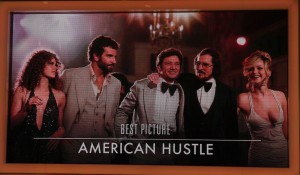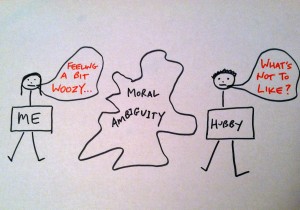There’s More Than One Way to Hustle
“You really aren’t comfortable with moral ambiguity, are you?”
This was the question my husband asked me shortly after we emerged, one evening last week, from seeing American Hustle. For some reason he thought I hadn’t liked the whole movie, when what I think I said was that I didn’t particularly warm up to any of the main characters, except for maybe Carmine Polito, who is open to taking money from an unknown Arab sheikh for the casinos because all he wants, really, is to help his people improve their standard of living and keep his pompadour intact.
While not seeing myself as moralistic or, perish the thought, preachy in a kind of tedious way, I guess I generally do feel I know my way around good and bad as well as the next person, so the question – coming from a bishop, no less– kind of brought me up short.
What he meant to get at, of course, was that every one of us, whether or not we’re in a hit movie, lives just as much in corruption as we do in glory. We’re not taking bribes left at right exactly; it’s more like we can’t escape being tainted by some form of decay, physical or moral. We all begin in dust, and to dust we shall return; but at the same time we are infinitely loved by God, and grace rains down on us perpetually.
Honestly I feel like I’ve spent a good deal of my married life trying to get the hang of this.
While I’m still not exactly sure who can be comfortable with moral ambiguity, I definitely do  appreciate that there’s plenty of grey area in between the white and the black with, let’s just say to change things up a bit, the white being “out of bounds – don’t do it or you’ll pay the price” and the black being “you’re on the moral high ground; set an example to others while you’re at it.” And yes, that movie did dare you to figure out whose side you were on; Richie DiMaso, the FBI guy played by Bradley Cooper, was supposed to be doing good, but his driving ambition not to mention his gullibility along with his falling helplessly for the Amy Adams character got the better of him and made him seem like a pretty big jerk.
appreciate that there’s plenty of grey area in between the white and the black with, let’s just say to change things up a bit, the white being “out of bounds – don’t do it or you’ll pay the price” and the black being “you’re on the moral high ground; set an example to others while you’re at it.” And yes, that movie did dare you to figure out whose side you were on; Richie DiMaso, the FBI guy played by Bradley Cooper, was supposed to be doing good, but his driving ambition not to mention his gullibility along with his falling helplessly for the Amy Adams character got the better of him and made him seem like a pretty big jerk.
The thing is, the very title of the movie is ambiguous. Sure, “to hustle” means to engage in small-time crime; but, as those of us who have been on the sidelines of many games know, it can also mean to move on down the field or ice or court with just the kind of energy, desire and gusto the sport demands. How many thousands of times have we heard, “Come on guys, hustle back on defense!” or “Suzie may not be the most skilled player on the team, but she really makes up for it in sheer hustle.” Out of the realm of sports and just in regular life, too, it’s about moving quickly in a good way, making it possible to get a lot of errands done in a short time, to meet a deadline, to achieve your goals. So completely American!
defense!” or “Suzie may not be the most skilled player on the team, but she really makes up for it in sheer hustle.” Out of the realm of sports and just in regular life, too, it’s about moving quickly in a good way, making it possible to get a lot of errands done in a short time, to meet a deadline, to achieve your goals. So completely American!
On the other hand, there is of course the magazine on the top row of many newsstands called The Hustler. I’m not positive, but I think that the sedentary women depicted on the cover would not exactly be described as striving for anything, except perhaps to subject themselves to the baser instincts of certain men.
It’s funny how, no matter how hard we may try to stick to some kind of moral code, things keep popping up that are a little slippery, like the ice on the driveway this winter. In what situations, for instance, is it OK to let your “knowing someone” give you some kind of advantage? If a person goes to serve at a local homeless shelter or to build a school in another country mostly to be able to take credit for the activity, does that negate the good deed itself? How often does our own drive to survive, or to advance, allow us to disregard – ever so slightly perhaps – either the truth or the real needs of others?
Around this house, anyway, I’m not planning on making a big deal of my knowing right from wrong all the time, mostly because I do plenty of stumbling in the fog. But the thought of waking up with moral ambiguity as my companion every single day leaves me feeling a little seasick. If my husband can handle it, fine for him.




I haven’t seen the movie “American Hustler” and I don’t know that I will but I do think about such ideas as moral ambiguity. The church has taught that there is a moral right and wrong, but I believe that most of us live in that gray area of moral ambiguity where it is not easy to determine what is right and what is wrong. The easy example is the friend who at a party asks if she looks okay. Saying yes would be a lie since she has a hole in the hem of her dress, but since the friend can do nothing about the hole in a social setting, and it would only serve to make her uncomfortable, then a good friend lies and says she looks fine. The choice being compassion over truth. The traditional college example is the lifeboat with ten men aboard, which is barely afloat when a cry is heard from the sea, another man needing to be saved. But the boat will surely sink with the weight of just one more man so the dilemma is what to do, take him aboard so all drown or let the single man drown to save the ten? Then further, if he is so exhausted he can only cry from the water, to do nothing is to make that decision without an act, but what if he tries to cling to the side of the boat and that behavior threatens to capsize the boat, does one man strike the man in the sea with an oar to force him to release the gunwale? It is all very difficult and there have been many thought-provoking discussions generated by such. The bottom line is that while we may never encounter a situation like the men adrift at sea, we do encounter moral ambiguities nearly every day of our lives and most of us live with choices that are not clear cut. The choices we make are cut from the cloth of our life experiences, sometimes, in hindsight, we see that they were the wrong choices. We do the best we can, given who, at that moment in time, we are, and I do not think the good Lord would ask anything further from us.